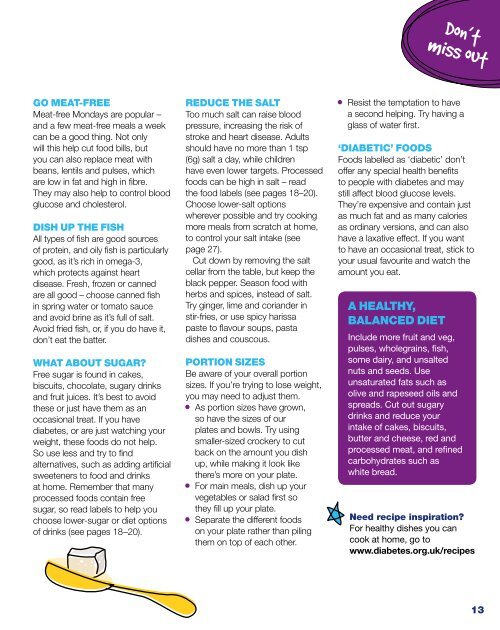Enjoy food
9f7d301hoGi
9f7d301hoGi
You also want an ePaper? Increase the reach of your titles
YUMPU automatically turns print PDFs into web optimized ePapers that Google loves.
Don’t<br />
miss out<br />
GO MEAT-FREE<br />
Meat-free Mondays are popular –<br />
and a few meat-free meals a week<br />
can be a good thing. Not only<br />
will this help cut <strong>food</strong> bills, but<br />
you can also replace meat with<br />
beans, lentils and pulses, which<br />
are low in fat and high in fibre.<br />
They may also help to control blood<br />
glucose and cholesterol.<br />
DISH UP THE FISH<br />
All types of fish are good sources<br />
of protein, and oily fish is particularly<br />
good, as it’s rich in omega-3,<br />
which protects against heart<br />
disease. Fresh, frozen or canned<br />
are all good – choose canned fish<br />
in spring water or tomato sauce<br />
and avoid brine as it’s full of salt.<br />
Avoid fried fish, or, if you do have it,<br />
don’t eat the batter.<br />
WHAT ABOUT SUGAR?<br />
Free sugar is found in cakes,<br />
biscuits, chocolate, sugary drinks<br />
and fruit juices. It’s best to avoid<br />
these or just have them as an<br />
occasional treat. If you have<br />
diabetes, or are just watching your<br />
weight, these <strong>food</strong>s do not help.<br />
So use less and try to find<br />
alternatives, such as adding artificial<br />
sweeteners to <strong>food</strong> and drinks<br />
at home. Remember that many<br />
processed <strong>food</strong>s contain free<br />
sugar, so read labels to help you<br />
choose lower-sugar or diet options<br />
of drinks (see pages 18–20).<br />
REDUCE THE SALT<br />
Too much salt can raise blood<br />
pressure, increasing the risk of<br />
stroke and heart disease. Adults<br />
should have no more than 1 tsp<br />
(6g) salt a day, while children<br />
have even lower targets. Processed<br />
<strong>food</strong>s can be high in salt – read<br />
the <strong>food</strong> labels (see pages 18–20).<br />
Choose lower-salt options<br />
wherever possible and try cooking<br />
more meals from scratch at home,<br />
to control your salt intake (see<br />
page 27).<br />
Cut down by removing the salt<br />
cellar from the table, but keep the<br />
black pepper. Season <strong>food</strong> with<br />
herbs and spices, instead of salt.<br />
Try ginger, lime and coriander in<br />
stir-fries, or use spicy harissa<br />
paste to flavour soups, pasta<br />
dishes and couscous.<br />
PORTION SIZES<br />
Be aware of your overall portion<br />
sizes. If you’re trying to lose weight,<br />
you may need to adjust them.<br />
• As portion sizes have grown,<br />
so have the sizes of our<br />
plates and bowls. Try using<br />
smaller-sized crockery to cut<br />
back on the amount you dish<br />
up, while making it look like<br />
there’s more on your plate.<br />
• For main meals, dish up your<br />
vegetables or salad first so<br />
they fill up your plate.<br />
• Separate the different <strong>food</strong>s<br />
on your plate rather than piling<br />
them on top of each other.<br />
• Resist the temptation to have<br />
a second helping. Try having a<br />
glass of water first.<br />
‘DIABETIC’ FOODS<br />
Foods labelled as ‘diabetic’ don’t<br />
offer any special health benefits<br />
to people with diabetes and may<br />
still affect blood glucose levels.<br />
They’re expensive and contain just<br />
as much fat and as many calories<br />
as ordinary versions, and can also<br />
have a laxative effect. If you want<br />
to have an occasional treat, stick to<br />
your usual favourite and watch the<br />
amount you eat.<br />
A HEALTHY,<br />
BALANCED DIET<br />
Include more fruit and veg,<br />
pulses, wholegrains, fish,<br />
some dairy, and unsalted<br />
nuts and seeds. Use<br />
unsaturated fats such as<br />
olive and rapeseed oils and<br />
spreads. Cut out sugary<br />
drinks and reduce your<br />
intake of cakes, biscuits,<br />
butter and cheese, red and<br />
processed meat, and refined<br />
carbohydrates such as<br />
white bread.<br />
Need recipe inspiration?<br />
For healthy dishes you can<br />
cook at home, go to<br />
www.diabetes.org.uk/recipes<br />
13


